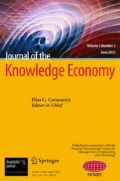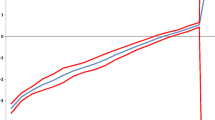Abstract
In the given research, the system of new knowledge production is investigated. The effectiveness of this system is estimated by the quality of produced knowledge, and also the analysis of the factors influencing on the quality of new knowledge was made. The Russian system of new knowledge production is considered specially, and the benchmarking with world regions allows to reveal strengths and weaknesses of the Russian system.










Similar content being viewed by others
References
Acs, Z J, Anselin, L, & Varga, A (2002). Patents and innovation counts as measures of regional production of new knowledge. Research Policy, 31(7), 1069–1085.
Bornmann, L, & Daniel, H D (2008). What do citation counts measure? A review of studies on citing behavior. Journal of Documentation, 64(1), 45–80.
Chou, Y C, Hsu, Y Y, & Yen, H Y (2008). Human resources for science and technology: analyzing competitiveness using the analytic hierarchy process. Technology in Society, 30(2), 141–153.
Dezhina, I (2008). State regulation of a science in russia (in russian).
Foray, D, & Lundvall, B. (1998). The knowledge-based economy: from the economics of knowledge to the learning economy. The economic impact of knowledge, (pp. 115–121).
Garfield, E, & Sher, I H (1963). New factors in the evaluation of scientific literature through citation indexing. American Documentation, 14(3), 195–201.
Garfield, E, et al. (1972). Citation analysis as a tool in journal evaluation. American Association for the Advancement of Science.
Gokhberg, L, Sagieva, G, & et al. (2007). Russian science: Bibliometric indicators. Foresight-Russia, 1(1), 44–53.
Goldfarb, B (2008). The effect of government contracting on academic research: does the source of funding affect scientific output? Research Policy, 37(1), 41–58.
Golichenko, O (2006). National innovative system of russia: a condition and development ways. Science.
Golichenko, O (2010). Modern technological revolution and the new possibilities of innovation development of “catch-up” countries (in Russian). Innovations, 3, 12–23.
Golichenko, O, & Malkova, A (2010). The provision of R&D by human resources (in Russian). In Post-crisis innovation process: 10th Drukerovskie Readings Novocherkassk (pp. 426–435).
Golichenko, O, & Malkova, A (2014). Diffusion characteristics of the system of a new fundamental knowledge production (in Russian). In Materials 2 of conference Civilization of knowledge (p. 205).
Golichenko, O, & Prihodko, A (2008). An estimation of research activity in russia and abroad (in russian). In Conference works Civilization of knowledge.
Griliches, Z (1979). Issues in assessing the contribution of research and development to productivity growth. The Bell Journal of Economics, 92–116.
Hessels, L K, & Van Lente, H (2008). Re-thinking new knowledge production: a literature review and a research agenda. Research Policy, 37(4), 740–760.
Hirsch, J E (2005). An index to quantify an individual’s scientific research output. Proceedings of the National Academy of Sciences of the United States of America, 102 (46), 16,569–16,572.
Kuznetsova, T (2009). Assessing the impact of scientific organizations in russia: fashion, or urgent need (in russian). In Proceedings of the international conference Civilization of knowledge” Moscow.
Lewison, G, & Dawson, G (1998). The effect of funding on the outputs of biomedical research. Scientometrics, 41(1–2), 17–27.
Manual, F (2002). Proposed standard practice for surveys on research and experimental development.
Markusova, V (2003). Cited Russian publications in the world scientific literature (in Russian). Herald of Russian Academy of Sciences, 73(4), 291–298.
Markusova, V (2005). Information resources for the monitoring of Russian science (in Russian). Herald of Russian Academy of Sciences, 7, 607–612.
Markusova, V (2013). Russian science citation index. the opinion of an interested user (in Russian). Herald of Russian Academy of Sciences, 83(3), 292–296.
Oppenheim, C (1995). The correlation between citation counts and the 1992 research assessment exercise ratings for british library and information science university departments. Journal of Documentation, 51(1), 18–27.
Oppenheim, C (1997). The correlation between citation counts and the 1992 research assessment exercise ratings for british research in genetics, anatomy and archaeology. Journal of Documentation, 53(5), 477–487.
Payne, A A, & Siow, A (2003). Does federal research funding increase university research output? Advances in Economic Analysis & Policy, 3(1).
Sivak, E, Yudkevich, M, & et al. (2008). Academic environment and local academic conventions. Foresight-Russia, 2(4), 32–41.
UNCSTD (1997). United nations commission on science and technology for development. Report of the working group on icts for development prepared for the 3rd session (12 may, geneva, switzerland).
Varshavskij, A (2004). ch. scientific potential a basis of innovative development: problems of reforming of the Russian science in book innovative management in russia: questions of strategic management and scientifically-technological safety (heads of a group of authors vl.makarov, ae.varshavsky).
Varshavskij, A, & Markusova, V (2009). It is spent with mind. Productivity of scientific work in Russia above than in America.
Zhou, P, & Leydesdorff, L (2006). The emergence of china as a leading nation in science. Research Policy, 35(1), 83–104.
Author information
Authors and Affiliations
Corresponding author
Rights and permissions
About this article
Cite this article
Golichenko, O.G., Malkova, A.A. The Analysis of Processes of New Knowledge Production in Key World Regions and Russia. J Knowl Econ 8, 1133–1145 (2017). https://doi.org/10.1007/s13132-016-0424-2
Received:
Accepted:
Published:
Issue Date:
DOI: https://doi.org/10.1007/s13132-016-0424-2




